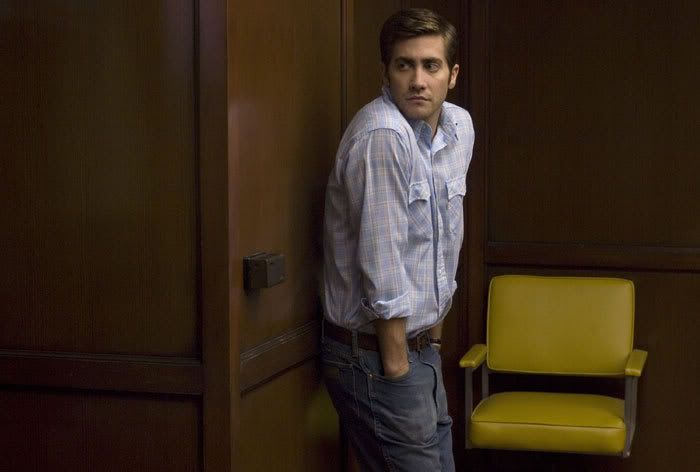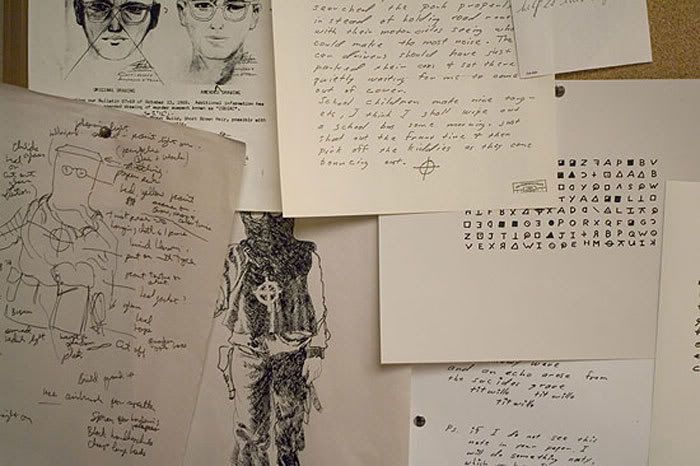Zodiac

by Ryland Walker Knight
That David Fincher’s new film, Zodiac, is the first major Hollywood release made entirely through digital means without any tape mediary goes against the film’s entire fascination with paper trails, with tangible proof, with building knowledge. Its being is illusory. This isn’t a film about a serial killer and the terror he wrecked on the greater San Francisco Bay Area in the late 1960s and early 1970s. Rather, it’s a film about how knowledge and identity remain elusive, to the end, even in the face of what appears self-evident truth.
Which is why Zodiac is inherently problematic, yet wholly engaging. Fincher’s films (such as thrillers Panic Room, Fight Club and Se7en) are habitually obsessed with violence first and ideas second, and it’s never been better illustrated than in the halving of Zodiac. In the first half of the picture we’re given non stop serial killer narrative, complete with gruesome murders, inquisitive reporters and the cops assigned to decipher these crimes. And, oddly, the second half is muddier—and better.
Jake Gyllenhaal expertly plays Robert Graysmith, aloof San Francisco Chronicle cartoonist & avid library advocate: our mediator (and surrogate) within the film. Through Graysmith’s obsession with the Zodiac killer, and his elusory trail (footprints, handwriting, scathed victims), we will see the world, and this case file’s particulars, unfold. His first access point is Paul Avery (Robert Downey Jr.’s physical precision expressing Avery’s mania dazzles), the Chronicle’s crime editorialist with a knack for the scoop and a taste for the sauce. As the case (and time) progresses, Avery disintegrates and fades from the story under the weight of knowledge he perceives to own. In his place, Inspector Dave Toschi (Mark Ruffalo’s paunchy, certain posture belies his sensitive voice) picks up and carries the narrative weight for most of the film’s middle section. Where Avery cherry picks random facts to serve his needs, Toschi is bent on culling coincidences to build an infallible case that hangs together solely for him. Both fail: By foregrounding their investment in the investigation they lose sight of the investigation itself.
Only after the killings are past tense does the film engage thought as an essential process—not only to understand the murders and identify their perpetrator, but how to negotiate and balance our lives. Yet the film is a near-exclusive boy’s room, crowding out the women and minimizing their resonance, thus unbalancing the film and unsettling the audience. But this friction, coupled with the structure’s deferred focus on Graysmith, helps us identify with his confusion in the face of so much jumbled information.
Graysmith, then, is the definitive curator of the film’s knowledge. He’s the only character to use the library, the only one we actually see opening books. His engagement with words defines, and solidifies, his involvement. Also, he is the only man to dialogue with a woman as a peer, his wife Melanie (Chloe Sevigny, always good); he understands his responsibilities, and how he’s failing them. In this, the second half is about how, in identifying the Zodiac, he will reclaim his life.
What’s odd, then, is how Graysmith articulates this identification: by writing a book. All his verbal exchanges lead to more questions, more uncertainty. When presenting his final culmination of research to Toschi, Graysmith is forever shuffling pages, presenting papers, positing printed words as proof. After Graysmith’s expositional monologue, Toschi thanks Graysmith for breakfast and implores him, “Finish the book.” Finishing the book, like the pithy eruption of histories that end the film, will somehow ground reality. But even in the ending, the facts don’t add up and you’re left wondering what truth to believe. Or, is there a truth to believe in? Zodiac, maturely, would have you believe there is—but it’s a scaffolding you erect for yourself, alone.
[The review is supposed to be available here but The Daily Californian's website is mostly unreliable.]

02007: 154 minutes: dir. David Fincher: written by James Vanderbilt, based on a series of books by Robert Graysmith.




This is fresh. After not knowing anything about this film other than ads on the subway, I am kind of pumped to go see "Zodiac" this weekend.
ReplyDeleteI enjoyed your review much more than the movie experience. I don't blame Fincher for the misfire... I suspect the source material is the problem. Individual scenes are well-executed, but the lack of conclusion (and no compelling central character--Graysmith isn't strong enough) underscores the absence of a dramatic arc. What makes the movie worth seeing (on DVD at least) is its ability to keep so many strands of narrative lucid. Perhaps the best I can say is that the movie played like Robert Altman directing a three-hour episode of CSI.
ReplyDeleteThe movie is a masterpiece, from where I sit. Fincher has a character desperately pursuing a need in every scene, and he invents myriad plausible, exasperating roadblocks to each little itch getting scratched. If Gyllenhal's character has to run a document over to somebody, Fincher makes sure he has to go down a long-ass hallway, through a rainstorm, past peddlers, jugglers and Jehovah's witnesses, before he gets there. Screenwriting and directing students could pull a rich semseter out of this flick.
ReplyDeleteAnd I think “finish the book” was Ruffalo's way of saying, "Nobody gives a shit about Zodiac anymore. If you want this case resurrected, your only hope is to get it back in the media spotlight by publishing a bestseller." Three words in this movie speak law library volumes. Great screenwriting.
I think I could have predicted both of your reactions.
ReplyDeleteI like the movie, no doubt, but I think there's something morally wrong in showing the killings in such an explicit manner. What makes it better than SE7EN, though, is the respect felt for the case and its dogged pursuers, if not its victims. It's the whole reason why I like JARHEAD so much: it's an anti-war movie because there's no fucking war in the movie. (Also, it has the best male ensemble acting since JARHEAD.) ZODIAC, then, gets great in the second half when its all about identification and naming. The details of how Graysmith spends his time, going "down a long-ass hallway, through a rainstorm, past peddlers, juggles and Jehovah's witnesses" are what make the film better as it progresses. And the fact that writing the book is supposed to be an end but it proves no end, only a slight victory -- for him alone. They can't even pin the thing on Leigh after the eye-witness "IDs" him!
Also, Robert Altman directing a three-hour episode of CSI sounds fucking tight and definitely apt. CSI is a horrible show but ZODIAC is a first-rate procedural that succeeds precisely because it complicates what an "ending" or a "solution" can be for whomever is searching.
And yeah, I think that's there in "Finish the book" but it's more personal than that: it says, you aren't foolish if you finish the book. We will never "solve" this thing but, at least, there will be some record.
Definitely the best movie of 2007 that I've seen (it may be the only proper 2007 release I've seen!) but it's also unbalanced and problematic. Not because of any "absence of a dramatic arc" though: it's unbalanced on purpose and in its teeter totter construction, it feels completely motivated and thought out. In that, the precision is deadly and unnerving. Yet I was thoroughly engaged the entire running time. I'd like to see it again.
I found the killings typical for Fincher. No context for the suffering, just an opportunity to fry the nerve endings of his audience. I agree, Ry, the filmed carnage struck me as amoral. Your insight about the second half rings true for me, too. The impact of the murder spree lasts for decades, and Graysmith's quest is about truth more than justice. Only problem: truth never arrives.
ReplyDelete1. Not "amoral" but "immoral".
ReplyDelete2. What "truth" are you hoping will come of the search? Graysmith finds a "truth" that suits him, in the end, even if it's fraught with its own complications and inconsistencies. The muddy ending seems more honest than the tidy finale of, say, SE7EN or other procedurals. It's why people kept watching TWIN PEAKS and got turned off when "Bob" was more than pure apparition. It's also what's frightening, at bottom, and keeps the story relevant.
3. Matt's review is pretty good.
The style of presentation struck me as amoral. As in, without a moral dimension. Fincher seems lacking in a moral vision. A storyteller with a moral response lends a layer of meaning to the suffering, helping the audience feel the loss of life in a murder scene.
ReplyDelete